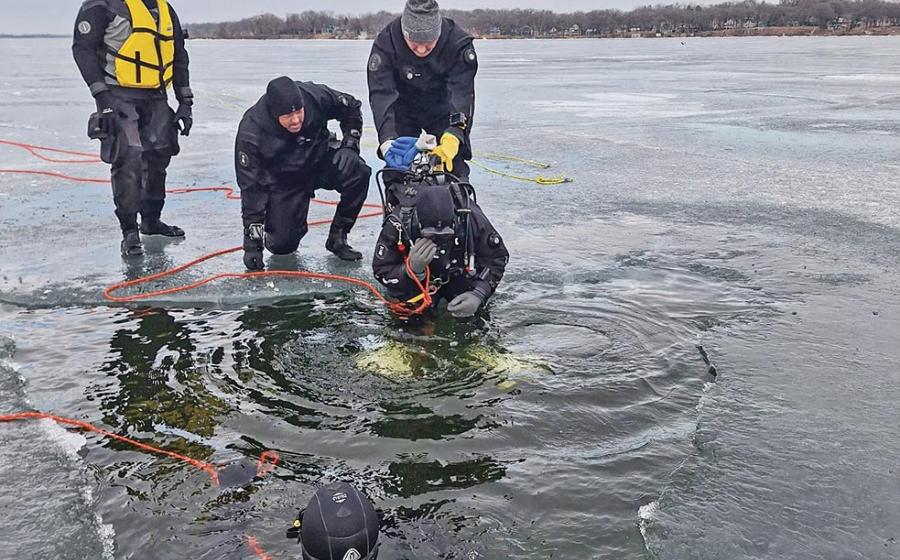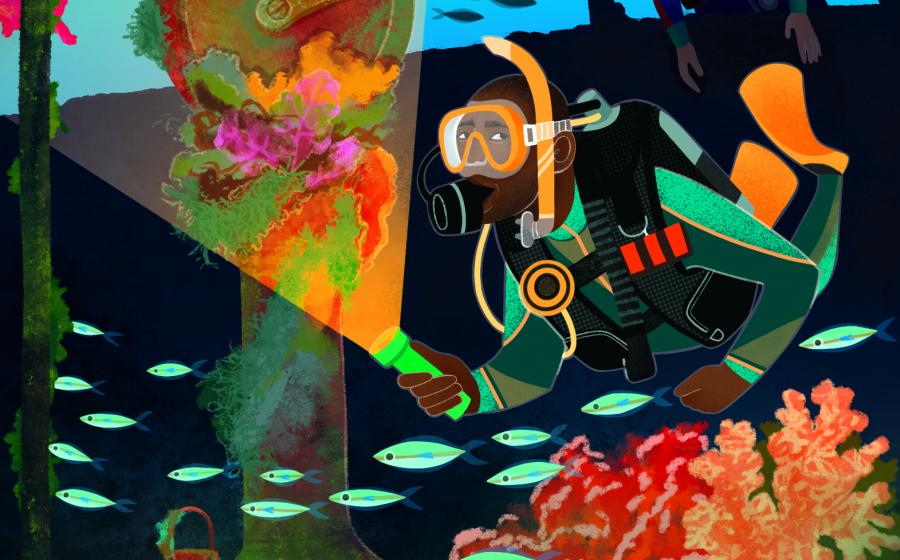Ask an Expert: Should Divers Reveal Their Medications?

AAE
Shutterstock
**Is the average dive professional really qualified to safeguard — never mind interpret — your personal medical history?
**By Larry Lozuk
Several years ago while managing an IT project at a large health-care provider, I witnessed my team lead being a perfect gentleman.
As we returned from lunch, he held the door open for a woman who happened to be walking into the building just as we were. She introduced herself as the facility’s compliance director for the Health Insurance Portability and Accountability Act (or HIPAA), requested his badge, and asked that he accompany her.
His seemingly innocuous act of chivalry had violated a security regulation, by passing the badge-reading system and potentially allowing someone unauthorized through an employee entrance. This led to hours of retraining for the entire team, once again covering the complex tangle of rules around security and privacy of medical records. The work we were doing was only tangentially related to health care, yet we were subject to the same confidentiality and security policies as the medical professionals who dealt directly with patient-health information.
In the scuba industry, we aren’t interested in the health of our customers, or what medication they might be taking. Really, we just want them to have a good time and then go home as healthy as they were when they came in.
However, by demanding and storing medical histories and medication lists, we willingly put ourselves in the same position as doctors’ offices, clinics and hospitals. We assume the responsibility to safeguard our customers’ medical information that, improperly disclosed, can affect their credit, their livelihoods and their lives.
We should all cringe to think of what is stored in those unlocked filing cabinets at countless dive shops across the world.
We also open ourselves up to liability by assuming the mantle of experts. While I can teach you all of the nuances of buoyancy, trim and different types of fins, I haven’t the slightest idea what drugs interact badly with one another, or with increased partial pressure of nitrogen or oxygen. Yet when I request a list of your medications, you probably have the expectation that I’m doing so for a reason, ostensibly to see if you have any conditions that are incompatible with scuba diving.
Would you be disappointed if I disclosed that I don’t even recognize any of the medication names?
The very best that I can do is encourage my customers to make an appointment with their doctor, point them to DAN, go over their current conditions and medications, and make an educated medical determination as to their fitness for scuba diving. Just don’t put me in the position of safeguarding patient health information or making pharmacological evaluations.
It’s not the meds but the underlying condition — and the risks that it might carry ****—**** that matters
By Eric Douglas
The diving medical community has done little or no research on medications and diving. No one really knows what effect pressure has on various medications.
So why should you be truthful with the dive operator about what medications you take? It’s private information, right?
While no one knows how pressure and medicines mix, we are less interested in the medicines than the conditions you take the medicine for. If those conditions aren’t safe to dive with, you need to think long and hard about diving at all — even if they are controlled by the medications.
I’m a big believer in telling the truth on medical forms. Even when (or especially when) a specific condition raises a flag on the form, you need to tell the truth.
Too many times, divers have decided to withhold information from medical-release forms only to have a heart attack and die on the dive boat. Often, the dive-boat crew had no idea there was any medical condition.
By withholding information on the form, you are putting your own life in jeopardy, and possibly the lives of rescuers. One of the many reasons people with active seizure disorders aren’t allowed to dive is the risk to the dive buddy in an emergency. Your buddy could be injured or killed in the act of attempting a rescue.
This is a serious liability issue for the dive operation. Any dive operator has the right to refuse you diving. If something happens to you on a dive, they can easily be sued.
The reverse is true too. If you fail to report a significant medical condition and something happens to you, it will make it much more difficult for you (or your heirs) to sue successfully in the event there was negligence on the part of the dive operation.
But I have a doctor’s release that says I can dive, you say? That’s fine. Carry a copy of that with you. Give it to the dive operation before they even ask for it.
Any time your medical situation changes, update the letter. For your safety, make sure your doctor is knowledgeable in diving medicine.
If you have a medical release signed by your doctor, most dive operations will allow you to dive. They will freely admit they don’t know much about medicine, but if a physician will approve it, they are fine with that. Can’t find a doctor who will sign a medical-release form based on your medications or your underlying medical condition? It’s time to take up a new sport.
There are various versions, but most medical forms are based on the form created by the World Recreational Scuba Training Council (download at wrstc.com). The complete form includes instructions for the physician to follow during the physical.


Shutterstock
Is the average dive professional really qualified to safeguard — never mind interpret — your personal medical history? By Larry Lozuk
Several years ago while managing an IT project at a large health-care provider, I witnessed my team lead being a perfect gentleman.
As we returned from lunch, he held the door open for a woman who happened to be walking into the building just as we were. She introduced herself as the facility’s compliance director for the Health Insurance Portability and Accountability Act (or HIPAA), requested his badge, and asked that he accompany her.
His seemingly innocuous act of chivalry had violated a security regulation, by passing the badge-reading system and potentially allowing someone unauthorized through an employee entrance. This led to hours of retraining for the entire team, once again covering the complex tangle of rules around security and privacy of medical records. The work we were doing was only tangentially related to health care, yet we were subject to the same confidentiality and security policies as the medical professionals who dealt directly with patient-health information.
In the scuba industry, we aren’t interested in the health of our customers, or what medication they might be taking. Really, we just want them to have a good time and then go home as healthy as they were when they came in.
However, by demanding and storing medical histories and medication lists, we willingly put ourselves in the same position as doctors’ offices, clinics and hospitals. We assume the responsibility to safeguard our customers’ medical information that, improperly disclosed, can affect their credit, their livelihoods and their lives.
We should all cringe to think of what is stored in those unlocked filing cabinets at countless dive shops across the world.
We also open ourselves up to liability by assuming the mantle of experts. While I can teach you all of the nuances of buoyancy, trim and different types of fins, I haven’t the slightest idea what drugs interact badly with one another, or with increased partial pressure of nitrogen or oxygen. Yet when I request a list of your medications, you probably have the expectation that I’m doing so for a reason, ostensibly to see if you have any conditions that are incompatible with scuba diving.
Would you be disappointed if I disclosed that I don’t even recognize any of the medication names?
The very best that I can do is encourage my customers to make an appointment with their doctor, point them to DAN, go over their current conditions and medications, and make an educated medical determination as to their fitness for scuba diving. Just don’t put me in the position of safeguarding patient health information or making pharmacological evaluations.
It’s not the meds but the underlying condition — and the risks that it might carry ****—**** that matters
By Eric Douglas
The diving medical community has done little or no research on medications and diving. No one really knows what effect pressure has on various medications.
So why should you be truthful with the dive operator about what medications you take? It’s private information, right?
While no one knows how pressure and medicines mix, we are less interested in the medicines than the conditions you take the medicine for. If those conditions aren’t safe to dive with, you need to think long and hard about diving at all — even if they are controlled by the medications.
I’m a big believer in telling the truth on medical forms. Even when (or especially when) a specific condition raises a flag on the form, you need to tell the truth.
Too many times, divers have decided to withhold information from medical-release forms only to have a heart attack and die on the dive boat. Often, the dive-boat crew had no idea there was any medical condition.
By withholding information on the form, you are putting your own life in jeopardy, and possibly the lives of rescuers. One of the many reasons people with active seizure disorders aren’t allowed to dive is the risk to the dive buddy in an emergency. Your buddy could be injured or killed in the act of attempting a rescue.
This is a serious liability issue for the dive operation. Any dive operator has the right to refuse you diving. If something happens to you on a dive, they can easily be sued.
The reverse is true too. If you fail to report a significant medical condition and something happens to you, it will make it much more difficult for you (or your heirs) to sue successfully in the event there was negligence on the part of the dive operation.
But I have a doctor’s release that says I can dive, you say? That’s fine. Carry a copy of that with you. Give it to the dive operation before they even ask for it.
Any time your medical situation changes, update the letter. For your safety, make sure your doctor is knowledgeable in diving medicine.
If you have a medical release signed by your doctor, most dive operations will allow you to dive. They will freely admit they don’t know much about medicine, but if a physician will approve it, they are fine with that. Can’t find a doctor who will sign a medical-release form based on your medications or your underlying medical condition? It’s time to take up a new sport.
There are various versions, but most medical forms are based on the form created by the World Recreational Scuba Training Council (download at wrstc.com). The complete form includes instructions for the physician to follow during the physical.











